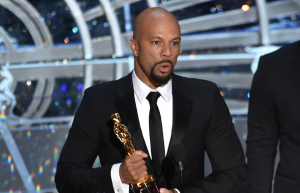The recording artist’s nod to Hong Kong protesters set off a social-media flame war.
BY DAVID WERTIMEFEBRUARY 23,
 From China, Love and Hate for Common’s Oscar Speech
From China, Love and Hate for Common’s Oscar Speech
After ascending the stage to receive the Oscar for Best Original Song along with popular crooner John Legend, the Chicago-born hip-hop artist known as Common sought to link the historic civil rights protests in Selma, Alabama with more recent struggles elsewhere. Common’s winning song, Glory, was dedicated to marches on Selma’s Edmund Pettus bridge; the “spirit of that bridge,” Common told assembled guests at the Feb. 22 awards ceremony in Los Angeles, “connects the kid from the south side of Chicago dreaming of a better life, to those in France standing up for their freedom of expression, to the people in Hong Kong protesting for democracy.”
Residents in the former British colony of Hong Kong were listening, as were their neighbors in mainland China, which now exerts sovereignty over the city. The online reaction that’s ensued signals a continuing divide between Hong Kong’s democracy advocates, who believe Beijing is unfairly interfering with Hong Kong elections, and mainland Chinese residents, many of whom strongly oppose the pro-democracy movement, remain suspicious of Western meddling in Hong Kong, and consider protesters there “spoiled” for demanding rights mainland Chinese don’t enjoy.
In September and October 2014, images of young Hong Kong pro-democracy protesters facing down police brigades and sleeping in street tents captivated Western media — and prompted Hong Kong’s head of government, C.Y. Leung, to lash out at “external forces” that he said were supporting what came to be known as the Umbrella Movement. The movement’s impact continues to reverberate, but it did not last long; in December, police removed demonstrators from their remaining encampments. Although the streets have been largely free of protesters since, tensions continue to simmer. Over 8,000 people returned to Hong Kong streets on Feb. 1 in a rally calling for a fair and free elections in 2017, and some have vowed to continue to fight.
On Weibo, a major social media platform in mainland China, criticism of Common’s speech has been fierce. “You sing some crappy song and then think you stand at the moral heights and understand everything,” one popular comment read. Another user wrote, “His supporting Hong Kong occupiers is free speech, and my calling him an idiot is also free speech.” Curse words and racial epithets were also in plentiful supply, prompting several to express disgust with what one called the lack of “public wisdom” online.
One frequent complaint about the speech was a perceived Western tendency, particularly in Hollywood, to opine on what many considered internal Chinese affairs. One wrote, “Some foreign entertainers who lack culture or knowledge and have only fame consider themselves policy-makers. Look at what democracy’s done in Ukraine, Libya, Egypt, and elsewhere. When Hong Kong was under English rule, where were the Westerners calling [for a] ‘free HK’??” Another mentioned widespread support in Hollywood for the exiled Tibetan spiritual leader Dalai Lama, who is largely vilified in Chinese state media, and wrote, “There’s nothing wrong with freedom of speech, but I really can’t stand” what the user called “Western fakery.”
For detail please visit here
